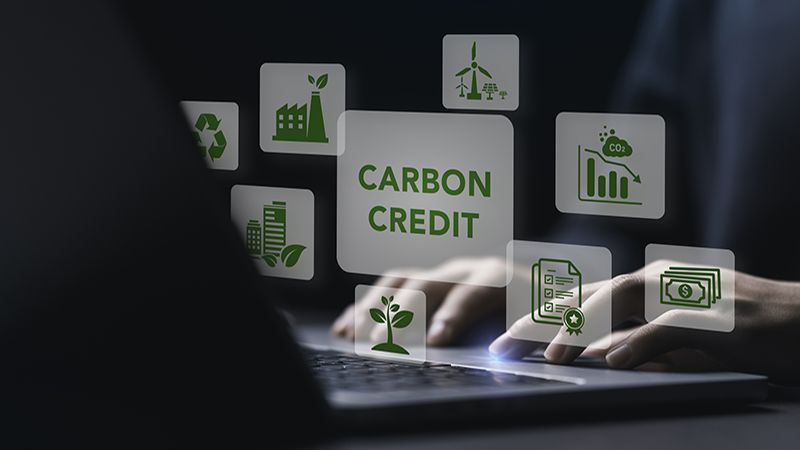The Science-based Targets Initiative (SBTi) has begun a consultation on the extended use of environmental attribute certificates (EACs) for the abatement of Scope 3 emissions beyond their current limits, a move that has been welcomed by many in the carbon markets industry but has reportedly seen pushback from SBTi employees and other vested interests.
EACs are a category of carbon accounting mechanisms that includes carbon offsets and renewable energy certificates. While 2023 saw significant setbacks in the carbon offsets industry, the SBTi’s extension could see thousands more global companies use carbon credits to offset their Scope 3 emissions, representing “a very big deal” for carbon markets.
In a statement announcing the change, SBTi said, while recognising there is still an ongoing debate on the subject, the use of EACs for Scope 3 abatement purposes could function as “an additional tool to tackle climate change”, as long as they were properly supported by policies, standards and procedures based on scientific evidence.
This would entail the definition of “specific guardrails and thresholds”, and the SBTi would consult with relevant initiatives as well as a broader set of stakeholders on the revision of the Scope 3 framework, including the responsible use of EACs in target-setting.
Crucially, however, the SBTi said they would not embark on validating the quality of carbon credits, as “other entities are better positioned to deal with this activity”. They will, however, enable all validating entities to have clear access and a complete understanding of the demand side guardrails and rules that the SBTi establishes for this purpose.
Following consultation, a first draft of the basic rules is expected to be issued by July 2024.
Pushback
However, according to a LinkedIn post, SBTi employees have reportedly issued an open letter to the board pushing back on the use of carbon offsets. In an apparent leak, a letter signed by “an overwhelming majority of SBTi staff”, accused the SBTI board of trustees of “undermining our Standard Operating Procedures and governance processes.”
“By communicating this as a decision made by the SBTi rather than a position of the board, the board of trustees undermines ongoing work by SBTi staff to make recommendations around the considered use of EACs,” the letter goes on to say.
“The SBTi’s Standard Operating Procedure, approved by the board in December 2023, does not give the board sole decision-making authority to decide that EACs may be used in this way under SBTi standards.”
Reacting to the news in a post on LinkedIn, Andrew Griffiths, director of policy and partnerships at PlanetMark, said the confusion has “already rattled everyone and undermined confidence in SBTi”.
“If a change does eventually get made, it would be a significant shift from the current standard, which says offsets can only be used against unavoidable ‘residual’ emissions in a net zero strategy, which is limited to less than 10% of a company’s baseline carbon footprint (with Scope 3 typically representing 75%-99% of a company carbon footprint).
“Supporters say Scope 3 emissions are really hard and that corporates need more tools to tackle them. Detractors say this would reduce corporate motivation to take direct action and reduce emissions.”
Subsequently, in a clarification of their position, SBTi confirmed that any use of EACs for Scope 3 “will be informed by evidence”.
“Any change to SBTi standards, including use of EACs for Scope 3, will be conducted according to previously approved SBTi Standard Operating Procedure for developing standards, including:
- Research
- Drafting
- Public consultation
- Technical council review and approval
- Consideration and adoption by the SBTi board
“In July, a discussion paper with a draft proposal from SBTi about potential changes to Scope 3 will be published which will feed into the standard draft (drafting phase).”
In response to the consultation, the WWF – a founding partner of the SBTi – said that offsets “cannot be a substitute for reducing emissions from company operations, products, and value chains.”
“To support the radical transformation we need to see from companies, WWF has long advocated that carbon offsetting needs to be limited in its application to address a small percentage of residual emissions, be bolstered by increased accountability and pursued as part of a holistic and scientifically defined reduction pathway.
“Critically, companies with complex value chains need updates to Scope 3 guidance – to provide implementable, solution-oriented mechanisms that focus on prioritizing emission reductions. As SBTi continues its work to define Scope 3 guardrails for use of market mechanisms, to be published in July, WWF will continue to call for rigorous science and good governance to underpin all of SBTI’s efforts. Updated guidance should also address the very real concerns regarding the poor track record of offsets in delivering real emissions reductions and driving market transformation.”
Reaction from the carbon credit industry
Zander Dale, senior sustainability consultant at EcoAct, said he was excited by the announcement, including their use in voluntary carbon markets.
“This forward-thinking move not only expands our toolkit for achieving net-zero emissions but also highlights a crucial pathway for bridging the climate finance gap. It underscores the importance of scientific evidence and collaborative consultation in shaping robust, actionable climate strategies.
“In the spirit of the collaborative vision set forth by the end-to-end integrity framework at COP28, this marks a pivotal moment for companies committed to genuine climate action. It highlights the immediate necessity of strategically incorporating carbon credits, among other tools, into our climate and sustainability strategies, responding to the urgent call for collective action amidst the escalating climate emergency and nature loss.
“As we anticipate the SBTi’s detailed guidance in July 2024, we are keen to explore how these developments can deepen our emission reduction efforts, particularly across our value chains. We stand ready to align with these evolving guidelines, confident that through collective action, we can drive meaningful change.”
The International Emissions Trading Association (IETA) also welcomed the announcement, saying it offered “a practical route for corporates to engage in climate action”, fostering demand for trustworthy credits and delivering more climate finance to developing countries.
“IETA’s position will reinforce similar principles in our new Guidelines for High Integrity Use of Carbon Credits, which will be unveiled during IETA’s European Climate Summit in Florence, Italy. IETA believes the voluntary carbon market is evolving and adapting to changing dynamics, reflecting a positive evolution in response to the climate imperative to do more, faster.”
“We look forward to seeing further details on how this change will be applied.”
However, Ben Rattenbury, VP of policy at carbon data provider, Sylvera, cautioned that given quality will not be actively managed under SBTi, buyers will still have to take appropriate steps to set out and execute a high-quality credit procurement strategy that will withstand claims standards, such as VCMI, and increasing regulatory standards.
“The world can’t afford this transition without carbon credits, so it’s very encouraging to see SBTi open the door for companies to be able to use them for a proportion of their Scope 3 emissions reductions targets – while respecting the mitigation hierarchy.”








